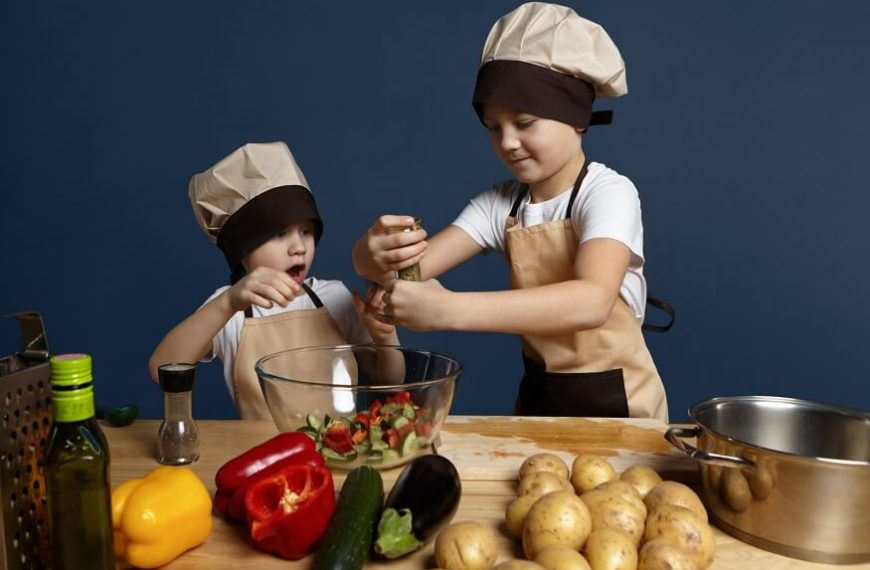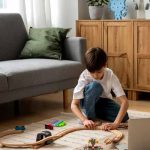The kitchen, often considered the heart of the home, is not just a place for culinary delights but also a hub for intriguing scientific experiments. Transforming everyday items into tools for exploration, kitchen science offers a delightful way to introduce preschoolers to the wonders of the scientific world. In this article, we’ll dive into the realm of kitchen science experiments for preschoolers, exploring engaging activities and the magic behind them.
The Marvels of Kitchen Science Experiments
- Fizzing Lemon Volcanoes:
- Dancing Raisins:
- Rainbow Skittles:
Turn an ordinary lemon into a bubbling volcano, captivating your preschooler’s imagination. Cut a lemon in half and hollow it out slightly. Place the lemon halves on a tray and sprinkle baking soda inside. Now, add a few drops of food colouring. Witness the fizzing eruption as you pour vinegar over the baking soda. This experiment not only amazes but also introduces basic chemical reactions in a fun and interactive way.
Experience the mesmerising dance of raisins in a glass of fizzy drink. Fill a clear glass with a carbonated beverage and drop a few raisins into it. Watch as the raisins bob up and down, seemingly choreographed by invisible forces. This experiment showcases the principles of buoyancy and gas release, all while delighting your preschooler with a lively performance.
Create a vibrant rainbow using the magic of Skittles and water. Arrange Skittles in a circle along the edge of a plate. Pour warm water into the centre of the plate, and observe as the colours dissolve and blend, creating a mesmerising rainbow effect. This experiment introduces concepts of solubility and water density in a visually stunning manner.
Also Read – Science quiz questions with answers for kids
The Role of a Kitchen Science Kit
Enter the realm of kitchen science with a purpose-built tool – the kitchen science kit. This kit serves as a treasure trove for young minds, packed with materials that make science accessible and enjoyable for preschoolers. The kit typically includes items like baking soda, vinegar, food colouring, and various safe-to-handle tools.
- Baking Soda and Vinegar Reactions:
- Colourful Concoctions:
- Tools for Tiny Scientists:
The kitchen science kit often features the dynamic duo of baking soda and vinegar. Harnessing the power of these common household items, preschoolers can create fizzing reactions, reinforcing the basics of acids and bases. The kit ensures a safe and controlled environment for these experiments, making learning both engaging and secure.
With the inclusion of safe food colouring, the kitchen science kit opens up a world of vibrant exploration. Preschoolers can mix colours, observe changes, and learn about the fascinating interactions between different substances. This hands-on experience promotes creativity and scientific curiosity.
The kit comes equipped with child-friendly tools, ensuring that preschoolers can actively participate in experiments without any safety concerns. From droppers for precise measurements to mixing spoons designed for small hands, these tools empower young scientists to conduct experiments independently, fostering a sense of accomplishment.
Kitchen Activities for Preschool
- Counting with Ingredients:
- Sorting and Classifying:
- Cooking as a Science Lesson:
Transform kitchen time into a counting lesson by involving preschoolers in measuring and counting ingredients. Whether it’s counting eggs, scoops of flour, or slices of fruit, this activity combines mathematical skills with the joy of hands-on participation.
Encourage cognitive development by involving preschoolers in sorting and classifying kitchen items. Grouping fruits by colour, categorising utensils by size, or arranging ingredients by texture all contribute to the development of critical thinking skills.
Turn everyday cooking into a science lesson by explaining the chemical changes that occur during the cooking process. From the rising of dough to the caramelisation of sugar, connect the dots between daily activities and scientific principles, making learning seamless and enjoyable.
Taking Learning Further: Expanding Horizons in Kitchen Science
- Oobleck Exploration:
- Ice Cube Excavation:
- Magnetic Magic:
Introduce preschoolers to the fascinating world of non-Newtonian fluids with the creation of oobleck. Mix cornflour and water in a bowl, adjusting the ratio until you achieve a substance that behaves like both a liquid and a solid. Allow your little ones to explore the peculiar properties of oobleck, promoting sensory play and understanding of material science.
Transform an ordinary ice cube into an archaeological adventure. Freeze small toys or objects in ice trays, and let preschoolers excavate the treasures with tools like spoons and droppers. This activity not only provides an opportunity for scientific observation as the ice melts but also enhances fine motor skills and patience.
Unleash the power of magnets in the kitchen by creating a magnetic sensory bin. Fill a container with items such as nuts, bolts, and other metallic objects. Armed with magnets, preschoolers can explore the concept of magnetism, discovering which items are attracted and why. This hands-on activity not only stimulates scientific curiosity but also enhances fine motor skills and coordination.
The Kitchen Science Kit: A Gateway to Discovery
- Safe Exploration:
- Parental Involvement:
- Customised Learning Paths:
One of the primary advantages of the kitchen science kit is the emphasis on safety. All materials included are carefully chosen to ensure that preschoolers can explore scientific concepts without any risk. The kit allows for hands-on learning without compromising on the well-being of the budding scientists, providing a secure environment for experimentation.
The kitchen science kit is designed to be a collaborative tool, encouraging parents and caregivers to actively participate in the learning process. This shared exploration not only strengthens the parent-child bond but also allows adults to guide and facilitate understanding, making science a family affair.
Tailored to suit the developmental stage of preschoolers, the kitchen science kit offers a variety of experiments that progressively build on each other. From simple colour mixing to more complex chemical reactions, the kit grows with the child, ensuring a continuous and engaging learning experience.
As we marvel at the wonders of kitchen science for preschoolers, it’s worth highlighting EuroKids – a pioneering institution dedicated to fostering holistic development in early childhood. With a curriculum designed to ignite curiosity and creativity, we go beyond traditional education, incorporating innovative methods to make learning a joyous experience for young minds.
Kitchen science experiments for preschoolers not only provide entertainment but also lay the foundation for a lifelong love of learning. The kitchen science kit and its activities offer a structured yet flexible approach to exploring scientific concepts, ensuring that the wonders of the scientific world are accessible to even the tiniest hands. So, don your aprons, gather your little scientists, and let the kitchen become a captivating laboratory of discovery.















